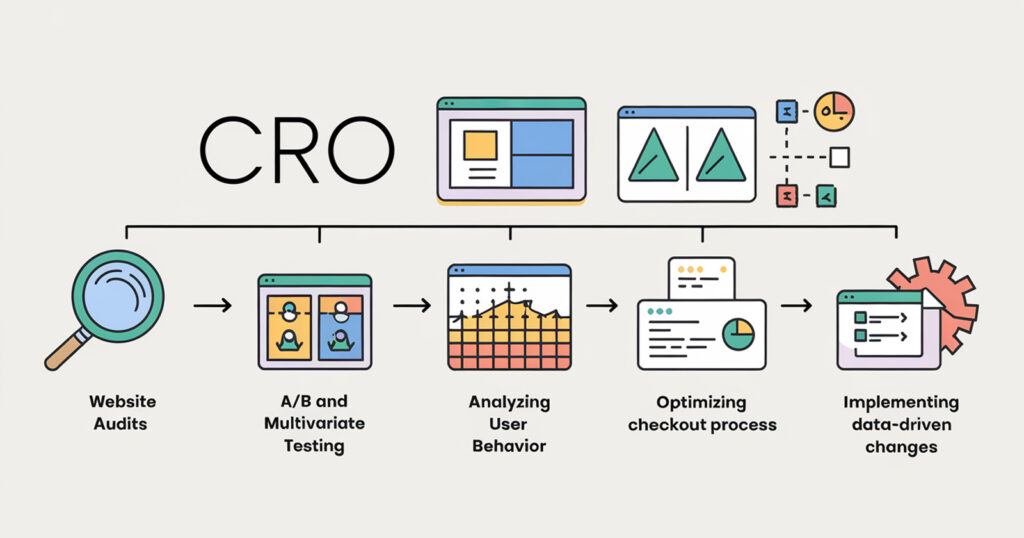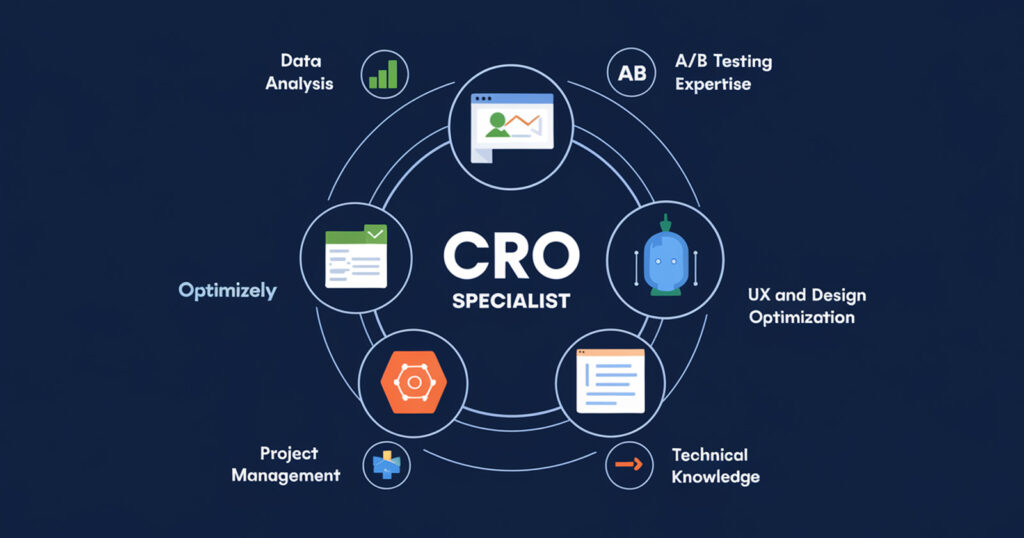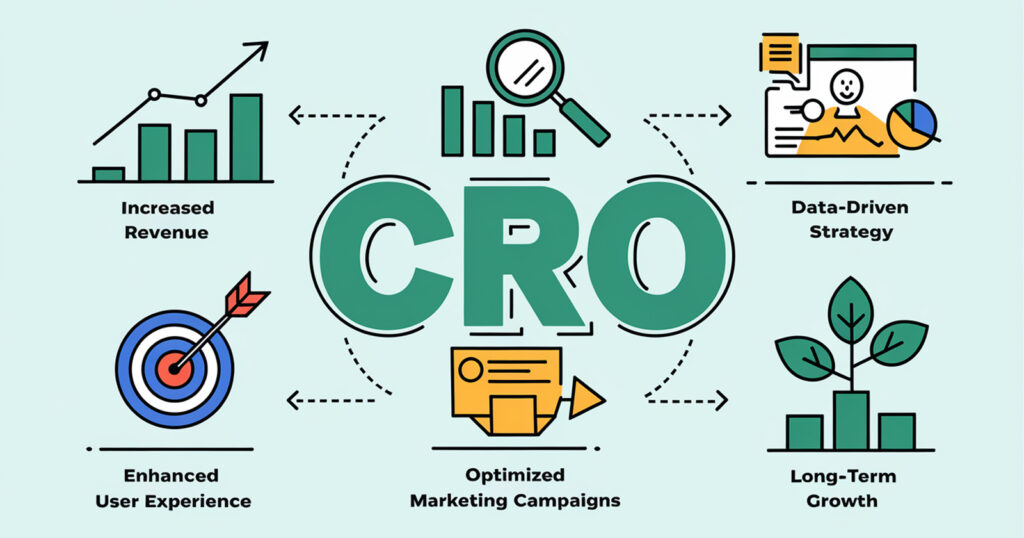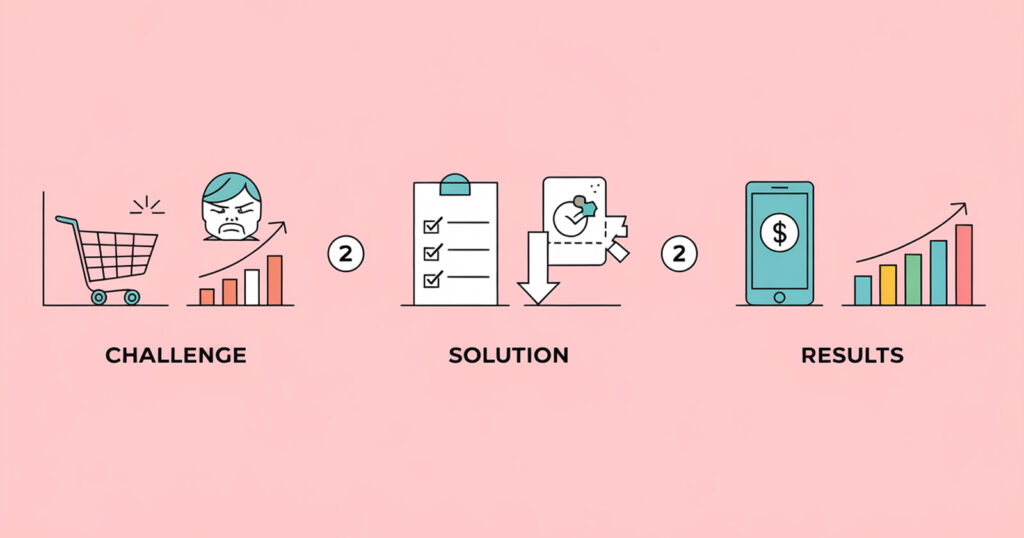
Conversion Rate Optimization (CRO) is a vital component of digital marketing for any business with an online presence. But implementing a successful CRO strategy requires expertise, data analysis, and constant experimentation. This is where a CRO specialist comes in.
A CRO specialist focuses on improving your website’s ability to convert visitors into customers, subscribers, or leads. In this post, we’ll dive into what a CRO specialist does, the skills they bring to the table, and why having one on your team can significantly boost your business.
The Role of a CRO Specialist

A CRO specialist is a digital marketing expert who focuses on increasing the percentage of visitors to your website that convert into leads or customers. Their primary goal is to optimize user experiences, test different site elements, and make data-driven changes that result in higher conversion rates.
Here’s a breakdown of their key responsibilities:
1. Conducting Website Audits
A CRO specialist begins by conducting a thorough audit of your website. They analyze every element that impacts conversions, such as page speed, user experience, and the effectiveness of calls-to-action (CTAs). They use this data to identify areas where potential customers may drop off or encounter obstacles that prevent them from converting.
Example: A CRO specialist might discover that slow-loading pages are causing high bounce rates or that users are abandoning their carts at checkout due to a confusing process.
2. Running A/B and Multivariate Tests
One of the core tasks of a CRO specialist is setting up and managing A/B tests and multivariate tests. They create different versions of a webpage to test which elements such as headlines, CTAs, or page layouts perform better. The insights from these tests help the specialist determine the most effective design for increasing conversions.
Example: Testing two different CTAs like “Buy Now” versus “Add to Cart” to see which one leads to more conversions.
3. Analyzing User Behavior
Understanding how visitors interact with your site is crucial to CRO. Specialists use tools like heatmaps, session recordings, and click-tracking software to analyze user behavior. These insights help them identify pain points and improve the user journey.
Example: A heatmap might show that users aren’t scrolling down far enough to see a CTA, prompting the specialist to move it higher on the page.
4. Optimizing the Checkout Process
In ecommerce, cart abandonment is a major issue. CRO specialists focus on simplifying and optimizing the checkout process to reduce friction and increase conversions. This could involve removing unnecessary steps, offering guest checkout, or making the payment process more seamless.
5. Implementing Data-Driven Changes
Once they’ve gathered enough data, a CRO specialist implements changes to your website. These changes are based on real user behavior and testing results, ensuring they’re not just guesses but backed by solid evidence.
Skills and Tools CRO Specialists Use

To succeed in their role, a CRO specialist must have a diverse skill set and access to various tools that help them analyze data, run tests, and make informed decisions. Here are some essential skills and tools used by CRO specialists:
1. Data Analysis
The ability to interpret data is crucial for CRO specialists. They need to analyze website performance metrics, such as conversion rates, bounce rates, and session durations, to identify problem areas and opportunities for improvement.
- Tools: Google Analytics, Mixpanel, Kissmetrics.
2. A/B Testing Expertise
CRO specialists must be skilled in designing and executing A/B and multivariate tests. They need to know how to set up tests correctly, track results, and interpret findings.
- Tools: Optimizely, VWO (Visual Website Optimizer), Google Optimize.
3. UX and Design Optimization
CRO specialists often work closely with UX designers to ensure the site’s layout, navigation, and content are optimized for conversions. They need to understand how design impacts user behavior and be able to recommend changes that enhance the user experience.
4. Project Management
CRO specialists often manage multiple experiments and projects simultaneously. Strong project management skills are required to prioritize tests, monitor progress, and collaborate with designers, developers, and marketing teams.
5. Technical Knowledge
A CRO specialist must have a good understanding of technical SEO, web development, and digital marketing. This helps them implement website changes, optimize page speed, and ensure that the website’s structure doesn’t hinder conversions.
- Tools: SEMrush, Screaming Frog (for technical audits and SEO improvements).
Why You Need a CRO Specialist for Your Business

Hiring a CRO specialist can provide a wide range of benefits to your business. Here are a few key reasons why having a CRO expert is essential:
1. Increased Revenue
A CRO specialist focuses on improving conversion rates, which directly impacts your revenue. By converting more visitors into paying customers, your business can increase its sales without needing to spend more on acquiring additional traffic.
2. Data-Driven Strategy
With a CRO specialist, every decision is based on data. Instead of making changes based on assumptions, a specialist conducts tests and uses real user data to optimize your website. This ensures that every improvement has a measurable impact on your bottom line.
3. Enhanced User Experience
Improving conversions often goes hand-in-hand with enhancing the user experience. A CRO specialist works to create a smoother, more intuitive experience for your users, which increases satisfaction and encourages repeat visits.
4. Optimized Marketing Campaigns
CRO improves the effectiveness of your marketing efforts. When your website is optimized for conversions, every marketing campaign (SEO, PPC, email marketing) becomes more effective, as you’ll see higher returns on your investments.
5. Long-Term Growth
CRO isn’t a one-time task; it’s an ongoing process of improvement. By continuously optimizing your website, a CRO specialist helps you achieve long-term growth by adapting to changing user behavior and market trends.
Case Study: How a CRO Specialist in Vancouver Helped Boost Conversions

Let’s take a look at how a CRO specialist in Vancouver helped a local ecommerce business significantly improve its conversion rate.
The Challenge
A Vancouver-based online retailer was experiencing high bounce rates and low conversions, despite investing in paid traffic. Visitors were abandoning their carts and leaving the site without making purchases.
The Solution
The CRO specialist conducted a thorough website audit, identifying issues such as confusing navigation, a slow checkout process, and poorly placed CTAs. After running A/B tests and analyzing user behavior with heatmaps, they implemented the following changes:
- Simplified the checkout process to reduce cart abandonment.
- Moved the main CTA above the fold to make it more visible.
- Optimized the website’s mobile experience, as a significant portion of traffic came from mobile devices.
The Results
Within three months, the retailer saw a 35% increase in conversions, leading to a substantial boost in revenue without additional traffic investment.
Conclusion: How a CRO Specialist Can Transform Your Business
Hiring a CRO specialist is one of the smartest investments you can make for your business. By focusing on optimizing the user experience, conducting data-driven tests, and making informed changes, a CRO expert can significantly increase your website’s conversion rate and your revenue.
If you’re ready to start improving your conversions, consider partnering with 7Roars. With our expertise, you can maximize the value of your website traffic and achieve long-term growth.
Frequently Asked Question (FAQs)
A CRO specialist focuses on improving your website’s conversion rate by conducting website audits, running A/B tests, analyzing user behavior, and implementing data-driven changes to optimize the user experience and increase sales.
Hiring a CRO specialist can boost your revenue by converting more visitors into customers, improve user experience, and provide a data-driven strategy for continuous growth without needing to spend more on traffic.
A CRO specialist should have strong skills in data analysis, A/B testing, user behavior analysis, project management, and a good understanding of UX design and technical SEO to drive successful conversion improvements.
Common tools include Google Analytics, Hotjar (for user behavior insights), Optimizely (for A/B testing), and Crazy Egg (for heatmaps and user recordings), as well as technical tools like SEMrush and Screaming Frog for audits.
Results from CRO efforts can vary based on the complexity of the website and the changes being implemented. However, most businesses see improvements in their conversion rates within a few months of consistent testing and optimization.
